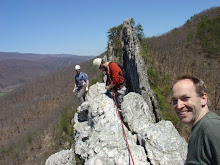 They might as well build a fence... My adventure across Sino-Burmese border was more of an accident than anything else. "Zhe shi Zhongguo ba?" A smirk appeared on my Wazu guide's face. I pointed at the ground again, having had some idea of the general direction which we drove and then hiked - West - "Zhe shi Zhongguo ba? Mian dian zai na li?"
They might as well build a fence... My adventure across Sino-Burmese border was more of an accident than anything else. "Zhe shi Zhongguo ba?" A smirk appeared on my Wazu guide's face. I pointed at the ground again, having had some idea of the general direction which we drove and then hiked - West - "Zhe shi Zhongguo ba? Mian dian zai na li?"Might as well not have asked. He didn't say it specifically, but we were in Burma.
Here there was a massacre, a war, and the ancient ruins of a Lafuzu temple. I had no clear understanding of where we were. West of Laoxianchen - that's about all I know. Up a dirt road, up a hidden mountain path, over a rock wall  (shown above), and into Burma. Simple. Not many foriegners come to this place. Hardly anyone outside of Ximeng has heard of it.
(shown above), and into Burma. Simple. Not many foriegners come to this place. Hardly anyone outside of Ximeng has heard of it.
 (shown above), and into Burma. Simple. Not many foriegners come to this place. Hardly anyone outside of Ximeng has heard of it.
(shown above), and into Burma. Simple. Not many foriegners come to this place. Hardly anyone outside of Ximeng has heard of it. The shuiniu, or water buffalo, lined the road, lead by men holding large crossbows. The men had small, brightly colored satchels over their shoulders. I would see more of these people later - in an area where Chinese wasn't standard, where they spoke the old languages.
The baskets is where the men would put the heads. The Wazu most highly valued men with beards. Sikhs were prized for their beards. These non-Chinese trans-national minority represent Southwest China for what it once was. In Ximeng, outside of the inaugural city, destined for a great future they said, now in shambles, China doesn't exist.
People exist.
We went to this village before Burma. They offered me beer at 11:30 in the morning, I remember looking at my watch. The men were chopping meat, a recently slaughtered pig. Two men were washing out pig intestines while shoo-ing away the hungry bush chickens.
One old man was shaving mugua, at least that is what they called it. I asked a young man next to him about the baskets - already knowing what they were. As I asked in Chinese and pointed across the field, the old man remembered, he looked up at me and roared a dirty, short laugh. He remembered.




 There were no saffron robes, neither heaping mounds of incense, nor mystical chanting of mantra filling the air. The temple, now turned into a tourist attraction, seemed dead. Religion seemed to have left it long ago leaving behind rotting statues of the Buddha and famous boddhisatvas.
There were no saffron robes, neither heaping mounds of incense, nor mystical chanting of mantra filling the air. The temple, now turned into a tourist attraction, seemed dead. Religion seemed to have left it long ago leaving behind rotting statues of the Buddha and famous boddhisatvas.






